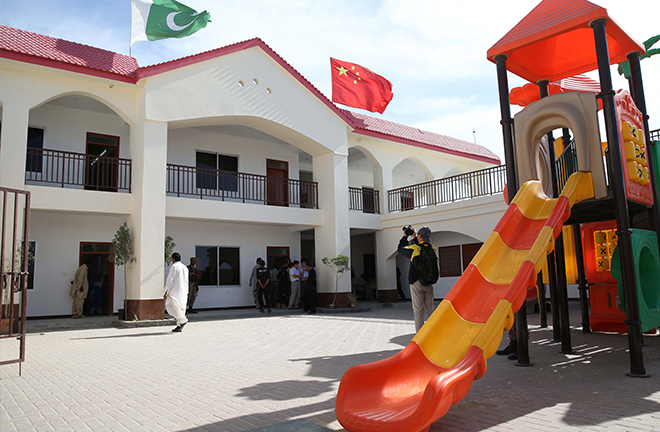Pakistani scholar challenges Western narratives

A primary school in Gwadar, Pakistan, which was built with the joint aid of the China Foundation for Peace and Development and China Overseas Port Holdings Limited Photo: XINHUA
In recent years, China has proposed a series of initiatives aimed at promoting global welfare. However, these efforts have been met with skepticism and disparaging coverage from certain Western media outlets and scholars. Against this backdrop of Western anti-China narratives, Syed Hasan Javed, former Pakistani ambassador to Germany, Singapore, and Mauritius, and director of the Chinese Studies Centre of Excellence at the National University of Science and Technology in Islamabad, offered his insights during a recent interview with CSST.
Civilizational diversity matters
Although narratives concerning “clash of civilizations” and “civilizational superiority” surface from time to time, cultural diversity is considered more widely as the inexhaustible driving force for human progress.
“The Western scholars’ arrogance is and has been proven misplaced. We have to however put the question in the right context. The Western world had hoped to maintain their 400-year global domination and hegemony in perpetuity, exercising all the levers of the contemporary system or so-called rules-based order,” Javed said.
He noted that the “clash of civilizations” and “end of history” theses espoused by Western scholars such as Samuel Huntington and Francis Fukuyama following the Cold War reflect the mainstream right-wing American ideology. Their fear of China and other countries as looming threats to Western civilization is due to their respective formidable growth and inherent power potential.
“The Western powers, in response, have been busy in building coalitions and quads. However, the Western world is mistaken, as China is no Soviet Union. But this fact is not likely to stop them in pursuing containment of China by engagement,” Javed remarked.
Javed pointed out that the Global Civilization Initiative launched by Chinese President Xi Jinping in March 2023 has won overwhelming global admiration and support.
“But this had the opposite effect on certain Western powers, who see in China growing power and global influence as yet greater reasons for their anxiety. The crux of the global anarchy lies in Western thought, which is not likely to resolve anytime soon. Mindset issues are hard to resolve,” he said. However, the fast-pace weakening of the elements of their civilizational power in the coming decades is likely to change the current Western mainstream mindset.
“The rest of the world needs to have adequate patience and exercise caution, not to let humanity sleepwalk into a self-destructive nuclear holocaust,” Javed warned.
Untenable narratives on BRI
Javed views the launch of the Belt and Road Initiative (BRI) as a masterful landmark in contemporary diplomacy by China. This initiative has stunned the Western world with shock and awe, underscoring China’s rising power, influence, and strategic capacity. “The BRI is a win-win strategy of utilizing $4 trillion investment in connectivity projects by the nations along the ancient land-based Silk Route and by building the 21st-Century Maritime Silk Road,” he commented.
As of June 2023, China has signed over 200 BRI-related cooperation agreements with more than 150 countries across the five continents and with over 30 international organizations.
Javed highlighted that the successful development of the BRI’s six corridors has already begun to shape the contours of the emerging new world order. For example, the success of the China-Pakistan Economic Corridor (CPEC), the flagship project of the BRI, represents a great achievement of the initiative due to the success of its First Phase (2015-2020).
“The CPEC has improved the environment, created job opportunities, ended electricity load shedding, and modernized infrastructure, ports, and highways. Currently, the CPEC is going through its Second Phase (2020-2025), which will create demand-side growth,” Javed emphasized.
Javed addressed the negative propaganda surrounding the BRI and the CPEC, noting that such reactions are to be expected given the scale, success, and strategic implications of these projects during a period of significant global transition and historical shifts in power. “We should all be thankful that this process of global transition is happening peacefully. History tells us that such strategic power shifts have not been without conflicts.”
He also dismissed claims about the CPEC causing a debt trap, environmental concerns, security issues, and political instability as untenable and groundless. The debt trap theory carries no weight as the terms and conditions of the CPEC projects were negotiated in good faith. He acknowledged a shortfall in engaging Chinese private sector investment to jumpstart the Pakistani economy through the operationalization of the Special Economic Zones.
As regards environmental concerns, Javed believes they are also exaggerated, arguing that the corridor has actually enhanced environmental standards through the incorporation of green projects under the BRI. This includes the development of renewable energy sources such as solar, wind, and hydel projects, Javed said.
Multidisciplinarity of development
In response to persistent Western claims over the past year, suggesting that the Chinese economy is on the verge of collapse or has peaked, Javed offered a detailed rebuttal: firstly, the declining GDP growth rate in China is because of the large GDP base effect, and secondly, economic growth is always related to market conditions, production costs, economies of scale, policies, management, technological innovation, regional and global environment, and the advantages and disadvantages of competitors. All these require huge sums of money in research and development.
Further, development is a multidisciplinary subject, Javed added. “China is now at a critical stage of its development, ready to enter the standard of high-income societies. It is a make or break stage. So far, China has done well. It can do well in the future too.”
Edited by CHEN MIRONG
